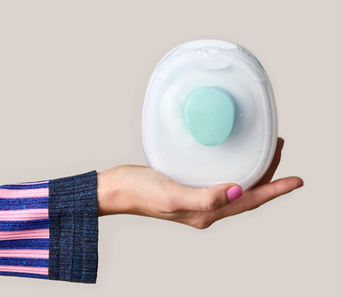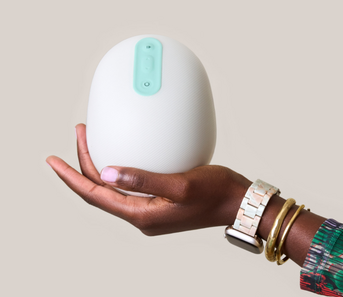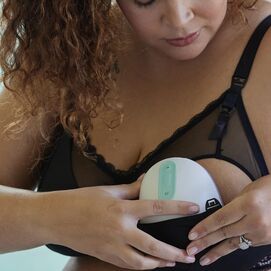If you’re a new mom, you can probably attest to the fact that, never before in your life, have you ever experienced such a multitude of different emotions all at once. From excitement and joy to anxiety and fear, there’s no limitation when it comes to how you can—and should—feel on your new-mom journey.
One thing that’s true for most moms is a feeling of almost being a different person. This is not just your imagination. While, yes, you are the same physical human, your body and your mind have gone through immense changes that actually alter the biochemical reactions in your brain (yes, seriously). In fact, one study, published in the journal Nature Neuroscience analyzed images of the brains of pregnant women and compared them to images of their brains postpartum and noticed a stark difference in the amount of grey matter (where most of the brain’s neurons exist), especially in the area of social cognition. What does this mean? It might sound like a bad thing, but it actually shows an enhanced level of efficiency.
“Our brain’s main purpose is survival, so it makes sense that our brains have evolved to enable us to nurture our babies through pregnancy, infancy and even further into childhood,” explains Sherry Kelly, Ph.D., a Licensed Clinical Psychologist and Clinical Neuropsychologist. “This drawback is that this type of adaptive advantage might also make mothers more vulnerable to depression, as we hyper-focus on the needs of our infants and less on ourselves.”
To combat any of the negative effects of these brain alterations, it’s important to amp up the self-care and self-awareness during the postpartum period. Doing so, Emily Guarnotta, Psy.D., clinical psychologist in New York state and blogger at The Mindful Mommy, notes, can help you navigate your experience. “While self-awareness helps us understand our experience, self-care is necessary for coping,” she says. “Finding time for self-care can be challenging as a parent, but even small doses of pleasure can help us connect with ourselves, which helps enhance our bond with our children.”
Not sure where to start? Below, experts share tips for how to embrace and evolve with your new-mom label.
Set up a trusty support system
Ideally in advance of having your baby, Dr. Kelly suggests creating a support system for yourself made up of people you trust and who won’t judge you. Most moms-to-be don’t put as much time and energy into planning their postpartum period as they do their baby shower, the nursery and their delivery, notes Dr. Kelly. “Nobody wants to plan this part because it’s not fun, but it’s important to mentally prepare and to get support lined up if you need it—without judging yourself!” she says. “Some new parents need more help in that postpartum period from family, a baby nurse, caregiver, friends, etc.—just know what resources are available and put them in place before you deliver.”
Explore your own self-expectations
In a time when it feels like everyone around you has expectations of you, consider what your expectations are of yourself—of being a new mom, a partner, a daughter, a sister, a friend, etc. Dr. Kelly suggests asking yourself: Are your expectations realistic? Are they based on someone else’s expectations? Are you feeling pressure to be more or give more than you feel is realistically possible? Doing a little bit of this self-exploration work can help you better understand yourself in your new-mom role.
Don’t judge yourself or your emotions
As mothers, we naturally place a lot of pressure on ourselves, as do those around us. However, this pressure can be quite toxic, especially during the postpartum period, warns Dr. Kelly. “Be prepared for the changing tide of emotions by realizing that they are neither good or bad and ask yourself, ‘What are these emotions trying to tell me?’” she says. “People do want to help, so try to articulate to them how they could help or what they could do to help you feel better at that moment.”
Try not to engage in toxic positivity
When things get difficult, which they will, Saba Harouni Lurie, L.M.F.T., Licensed Marriage and Family Therapist and owner and founder of Take Root Therapy in Los Angeles, urges mothers to try to acknowledge and honor all of the changes that have occurred to them. “While becoming a new mother will likely have some highs, there are lows too, so we can’t judge ourselves for struggling or for not feeling ecstatic all the time,” she says. “Pretending you're always happy when you're not, or being expected to be ecstatic when you're, in fact, suffering, can be very damaging.”
Be prepared for things to keep changing
As with any transition in life, change is inevitable; however, in motherhood, the changes never stop. “Oftentimes as parents, as soon as we feel we’ve reached a level of ‘parental mastery,’ our child changes overnight and we are faced with new challenges,” she says. “Be prepared to feel unprepared, as this will make it easier to be flexible and humble during this daunting evolution, and give you more of a sense of humor when you find yourself confused by whatever new stage your child has entered.”













